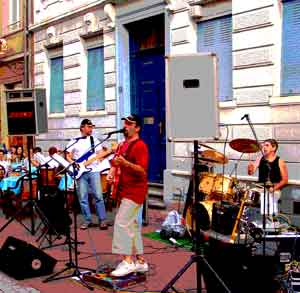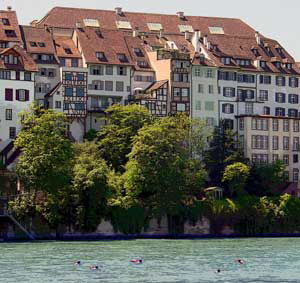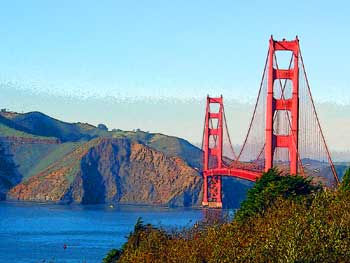July 2003
- Bill and Nancy
- Feb 6, 2021
- 7 min read
Updated: Mar 18, 2021

The transportation workers in France were striking at least one day a week during June. The strike was over important issues, but the workers must have also been happy to have time off because it was too hot and humid to work.
We cruised slowly up the Doubs River and down the Rhine River on our way to Strasbourg. We planned to stop early on days that we moved, staying a few days when we found a mooring that we liked, and not rushing at all. Usually, something comes along to change our plans, but this year the hot weather and the strikers help us keep a slow pace.
The weather was hot every day, and during the early part of the month, the one-day strikes sometimes expanded into three or four-day strikes. For us, it was lovely, like a vacation within our vacation. We rode bikes in the morning, and in the heat of the day, we relaxed in the shade on our back deck. We had time to read books and take naps. If we had a hammock, we would have been in it almost every afternoon.

In Besançon, we rode our bikes everywhere in search of a cool breeze. The path along the river was pleasant, and we often returned to the city park's shade. When we missed the little train that leaves every hour for the citadel, we decided to ride up on our bikes. From the guard tower at the fort, we could see our barge moored just below. It was a long and challenging climb up, but we created a nice breeze for ourselves on our speedy descent.
Because of all the strike days, we were in constant contact with the VNF offices. VNF stands for Voies Navigables de France, they are the people who control the French waterways, and we began each cruising day with a phone call to them to make sure that the locks ahead would be open. The people who answered the phones in the office would never know if the lock-keepers would show up for work until they did or didn't appear at their scheduled starting time. There were several mornings where we made all of our casting off preparations and had our engine running when we called so that we could leave as soon as we got the word, only to learn that no one had shown up for work that day. It took a few false starts before we backed away from our Besançon mooring and entered the tunnel on our way to Mulhouse.

Backing up maneuvers and going through tunnels are two things that used to make us very nervous. Every cruising season, we realize that our skills have improved when we find ourselves calmly doing something we would have been afraid to attempt in our first year. In Mulhouse, we impressed ourselves by making a smooth 90-degree turn, backward, into our shady mooring.
La Fête de la Musique, France's national music festival, on the 21st of June, is one of our favorite events. On the longest day of the year, all over France, in the big cities and small villages, music fills the air, and everyone is drawn out of their homes to enjoy the summer evening. After a barbecue with other boaters at the port, we went into town to see what Mulhouse had to offer.
Walking through the park, we passed a loud band that was attracting all of the teenagers. Turning the corner, the lead singer of a rock band was prancing in front of what looked like his backup singers in the dress shop's window. On a street with several restaurants, people enjoyed American rock and roll from the '60s with their dinner. In the main square in town, in front of the Hotel de Ville, a group of native dancers from Reunion, a French island in the Indian Ocean, performed to a drums' beat. There were gospel singers in the church and an excellent youth orchestra in the cathedral. There was something for everyone.
After midnight when we began to head back to the port, we passed young families pushing sleeping babies in strollers, outdoor cafés full of music lovers, and teenagers dancing in the park. The music and the people were still going strong.
The next morning, Sunday, we took the train to Switzerland, just because both the train station and the country were close. Once in Basel, we found that they speak more German than French, and we had forgotten all about the fact that they still use Swiss francs. Suddenly, we couldn't make ourselves understood, and we had no money.
It was another hot day, and we found the city practically empty. It was too hot for the natives, and the only people we saw on the street seemed to be tourists, like us. We headed for the Rhine River and found the people. They were enjoying the restaurants, biking, or strolling along the river. We found a table on a pleasant shaded terrace in a restaurant that accepted our credit card, ordered lunch, and watched as the people and the river flow passed. After a while, we realized that we were seeing the same wet people walking purposefully by wearing their swimsuits and shoes. Some of them carried what looked like flotation devices, but we later discovered that these were waterproof packs for their clothes and towels. The current was flowing swiftly. Once we started watching these people, we found that they were walking upstream, jumping into the river, riding the strong current downstream, coming back into the shore where the river curved, getting out, walking back upstream, and jumping in again. They did this over and over again. It looked tempting.
Leaving Mulhouse, after about ten days, we were rested and ready for the challenge of a trip down the Rhine River. For the past three years, we have heard so many times that you should hire a professional pilot to take you through all of the traffic on this big river with a strong current. This portion of the Rhine was not in our French charts, so it also had a mysterious air about it. In the port of Mulhouse, we asked questions of the boaters who were familiar with the trip. They convinced us that we would not need a pilot, and armed with copies of the German charts from one particularly helpful French boater, we set off, feeling more confident but still with some apprehension.

Maybe because it was a Sunday, we did not encounter as much traffic as we had expected, but the barges that did fly past were 100 meters long, and they created ocean waves in their wake. We rocked and rolled a bit and thought of our American friends who made the same trip a few days before in a cabin cruiser.
Thanks to our German charts, we had the phone number of a port that we were approaching at the end of the day, and when we called, they said that they had space for us. Following the chart, we turned right at the top of an island and circled to the other side to find the Port de Plaisance de L'ile de Rhin. We carefully entered the port and moored along a pontoon. It was easy to moor, but we knew that we would have to think about making our exit in the morning, as there was no room to turn around. We would have to develop another brilliant backing-up maneuver to get us out without bumping into small boats or the large rocks that narrowed the entrance.
Sitting on our back deck relaxing after we did all our mooring jobs, we looked across the river and saw a German city. We looked further along and saw a bridge that we could walk over to get there. We couldn't pass up the idea of dinner in Germany, so we dressed and prepared for the long walk. The port captain and his wife were sitting in the shade near their office, and when we asked them some questions about how to best walk over, they suggested that it would be easier if the captain took us across the river in his motorboat. We happily agreed and suddenly found ourselves racing toward the city of Breisach am Rhein.

The captain delivered us to a German yacht club on the other side of the Rhine, where we could easily walk into Breisach. Walking into town, we realized how familiar we have become with life in France. Suddenly, we wondered whether any stores would be open on Sunday when a restaurant might begin serving food or even if the restaurants would be open. How would we ask for directions to get home again since we couldn't expect to get a boat ride back? Suddenly, we were foreigners again. We have a German phrasebook, but we forgot to bring it along. It was getting late, and we were hungry, so we went directly searching for a restaurant. We found several to choose from along the pedestrian street, and we chose the one with a shaded courtyard and the most customers.

We didn't recognize many words on the menu, and we could have used that phrasebook we left back on the boat. With some help from our waitress, who spoke a few English words, we asked for something typical of the region. We ordered a local wine without knowing whether it was going to be dry or sweet. We could have ordered glasses of beer the size of Texas, as our neighboring German diners, but since we feel now more French than German, we chose the wine.
Dinner was good, not too strange considering that we didn't know what we were ordering, and we were able to pay with our Euros. About three hours after our German experience began, we decide to call a taxi. We began to doubt that we could find our way back to our port in the dark, and we were already pretty exhausted from just trying to communicate. Since we only know how to say please, thank you, good morning, and God bless you in German, we thought it would be better to have a taxi take us back to the French side of the Rhine River.
Our little adventures into Switzerland and Germany helped us appreciate the progress we have made in our French struggles. Spending time in countries where we didn't know more than a few words of the language helped us recognize how large our French vocabulary has become.
We now look at our French language skills as a glass half full instead of a glass half empty.














Comments